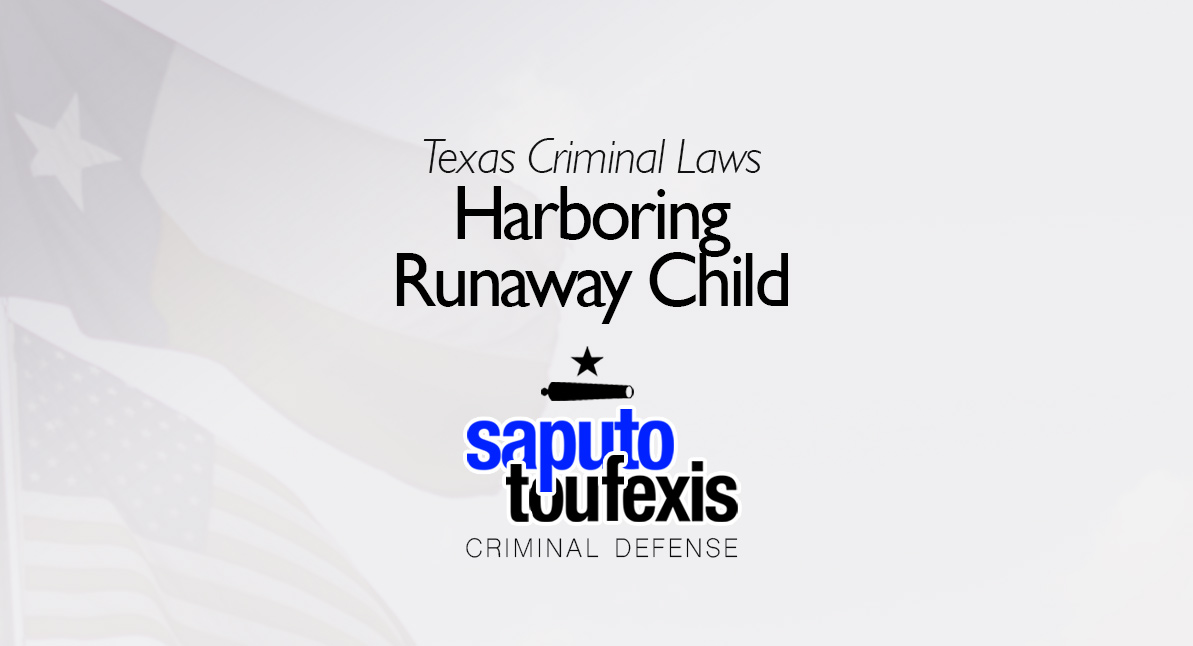The Harboring Runaway Child law in the state of Texas makes it illegal to provide a home or shelter to a child if you should have known that the child was a runaway and the child is unrelated to you unless you report the child to its parents or law enforcement.
FAQs about the
Harboring Runaway Child law in Texas
- What is the current Texas law about Harboring Runaway Child?
- What is the penalty for a Texas Harboring Runaway Child offense?
- Are there any defenses to prosecution of this offense?
- How can I be charged with a Harboring Runaway Child offense in Texas?
- What is the statute of limitations for Harboring Runaway Child in Texas?
- Can you get probation for Harboring Runaway Child in Texas?
- Do I have to register as a sex offender in Texas if guilty of Harboring Runaway Child?
- What level of crime is Harboring Runaway Child in Texas?
In Texas, Harboring Runaway Child applies to children younger than 18 years old who escaped from state custody or who left home without the consent of the child’s parent or guardian.
Have you been charged with Harboring Runaway Child? Contact us today to discuss legal representation.
or Text or Call (888) 239-9305
The law applies to runaways who are voluntarily absent. So, if you take the child out of a home involuntarily, the state would prosecute under the Kidnapping or similar law. The law requires the state to prove criminal negligence in order to obtain a conviction.
The Texas legislature codified this criminal offense in Texas Penal Code Section 25.06. The law was not updated in 2025. In fact, this law has not been amended since 1995.
The Penal Code classifies the Texas Harboring Runaway Child law under Title 6 “Offenses Against The Family,” Chapter 25 “Offenses Against The Family.” This chapter includes crimes that focus on familial, parent, and spousal relationships. Some of the offenses relate to sexual or violent behavior, while others deal with custody and possession of children. Learn more about the Texas offense of Harboring Runaway Child below.
What is the current Texas law about Harboring Runaway Child?
AV Preeminent Texas lawyer Paul Saputo provides the current law defining Harboring Runaway Child in Penal Code Section §25.06, as follows:[1]
(a) A person commits an offense if he knowingly harbors a child and he is criminally negligent about whether the child:
(1) is younger than 18 years; and
(2) has escaped from the custody of a peace officer, a probation officer, the Texas Youth Council, or a detention facility for children, or is voluntarily absent from the child’s home without the consent of the child’s parent or guardian for a substantial length of time or without the intent to return.
What is the penalty for a Texas Harboring Runaway Child offense?
A conviction for Harboring Runaway Child in Texas is punished as a Class A misdemeanor,[2] with a maximum possible fine under Texas state law of up to $4,000 and jail time of up to one year.
Are there any defenses to prosecution of this offense?
If you are related to the child, “within the second degree by consanguinity or affinity” as defined by Chapter 573, Government Code,[3] the statute allows you to present evidence of this as a defense to prosecution.[4]
If you notify law enforcement or the child’s caretakers within 24 hours, you can present evidence supporting that claim to a jury if you are prosecuted for Harboring Runaway Child. If the jury believes you, they may find you not guilty based on an affirmative defense in the statute.[5]
How can I be charged with a Harboring Runaway Child offense in Texas?
You can be charged with Harboring Runaway Child in Texas if the state’s attorneys believe that each of the elements of §25.06(a) as described in the section above have been met.
What is the statute of limitations for Harboring Runaway Child in Texas?
As a misdemeanor, Harboring Runaway Child charges have a two-year limitations period.[6]
Can you get probation for Harboring Runaway Child in Texas?
The Texas Code of Criminal Procedure allows both judges and juries to grant probation for Harboring Runaway Child, and judges are also allowed to accept deferred adjudication plea deals.[7]
Do I have to register as a sex offender in Texas if guilty of Harboring Runaway Child?
The Harboring Runaway Child offense does not appear on the list of offenses requiring registration under Chapter 62 of the Texas Code of Criminal Procedure.[8]
However, the legislature can add this offense to the list at any time. If that happens, people convicted of Harboring Runaway Child would have to register, even if the offense did not appear on the list at the time they accepted a deferred adjudication plea (even if later dismissed), pled guilty or were found guilty.
What level of crime is Harboring Runaway Child in Texas?
The Penal Code classifies the punishment for Harboring Runaway Child as a Class A misdemeanor.
Learn more about the penalty range for this offense in the section above.
Legal References:
^1. Texas Penal Code §25.06. This law is current as of 2025.^2. Texas Penal Code §25.06(d)^3. Chapter 573, Government Code^4. Texas Penal Code §25.06(b)^5. Texas Penal Code §25.06(c)
It is a defense to prosecution under this section that the actor notified:
(1) the person or agency from which the child escaped or a law enforcement agency of the presence of the child within 24 hours after discovering that the child had escaped from custody; or
(2) a law enforcement agency or a person at the child’s home of the presence of the child within 24 hours after discovering that the child was voluntarily absent from home without the consent of the child’s parent or guardian.
^6. See Code of Criminal Procedure 12.02(a)^7. See Chapter 42A, Texas Code of Criminal Procedure, Art. 42A.054, Art. 42A.056, Art. 42A.102^8. Code of Criminal Procedure, Article 62.001










